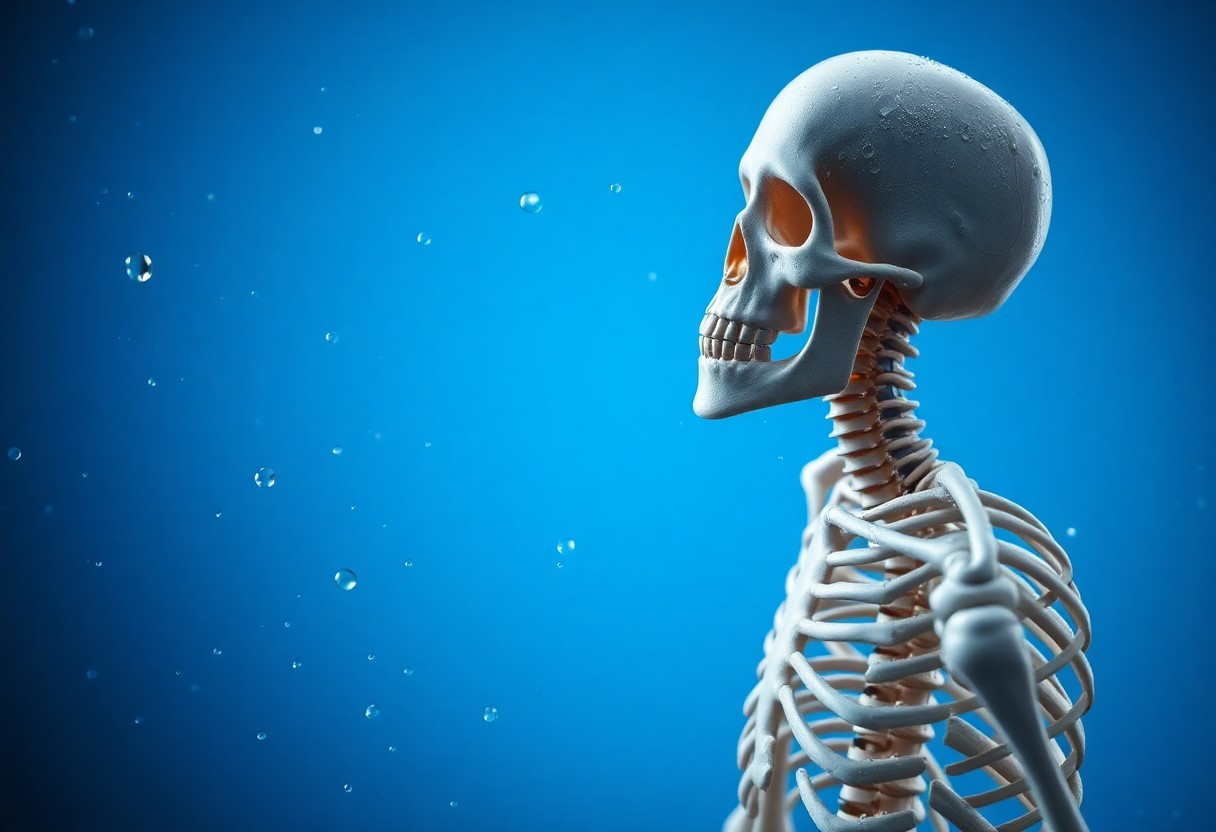
What Role Does Water Play In Keeping Bones Strong?
Strength is not solely determined by the minerals you consume; your hydration levels also play an integral role in maintaining strong bones. Water is vital for optimal nutrient transport, and it aids in the assimilation of calcium and other minerals important for bone density. When you’re well-hydrated, your body can efficiently remove toxins and maintain a healthy balance of nutrients, helping to prevent conditions such as osteoporosis. Therefore, ensuring you drink enough water daily is important for not just your overall health but specifically for keeping your bones strong. Strengthen your bones naturally with pure RO water, keeping your body hydrated and supporting long-term bone health

Key Takeaways:
- Water helps maintain hydration, which is vital for the transport of nutrients necessary for bone health.
- Proper hydration supports the viscosity of synovial fluid, allowing joints to function efficiently and reducing wear on bones.
- Fluid balance aids in the regulation of calcium levels in the body, affording protection against bone density loss.
- Optimal water intake can help mitigate the risk of osteoporosis by ensuring effective metabolic processes for bone repair and strength.
- Staying hydrated supports overall health, indirectly benefiting bone wellness through improved physical activity and mobility.
The Biochemical Connection: Water and Bone Health
The Composition of Bone and the Role of Water
Bone is a dynamic tissue, comprised largely of a matrix containing collagen—the main structural protein. This matrix is interspersed with minerals such as calcium and phosphorus, which are significant for bone density and strength. Water plays a fundamental role in maintaining this delicate balance by aiding in the transportation of key minerals from your bloodstream to bone tissue. The hydration status of your body directly affects the viscosity of synovial fluid, which lubricates joints and facilitates nutrient delivery to bones.
Additionally, water contributes to the bonelike structure that holds minerals in place through its involvement in cellular processes. Osteoblasts, the cells responsible for bone formation, rely on proper hydration to function optimally. If your water intake is insufficient, the dynamics of mineral absorption and retention may shift, potentially leading to weaker bones over time. Keep your bones strong and healthy with a water dispenser that makes staying hydrated easy and convenient every day
Hydration’s Impact on Bone Density and Strength
Hydration has a direct correlation with bone density and strength. Consistent water intake can help to maintain optimal bone density, reducing the risk of conditions such as osteoporosis. Studies show that individuals who maintain higher levels of hydration have a lower incidence of fractures and improved bone health. Conversely, chronic dehydration can lead to mineral imbalances and, as a result, a decrease in bone mass and integrity.
Your body naturally stores about 14% of its water content in bones, and this reservoir can influence various bodily functions, including mineralization and repair processes. Adequate hydration supports the bioavailability of crucial nutrients necessary for bone remodeling, ensuring that the osteoblasts and osteoclasts—the cells that build and break down bone—function effectively. Avoiding dehydration helps maintain optimal bone strength, ultimately contributing to your overall skeletal health.
Furthermore, the relationship between hydration and physical activity cannot be overstated; regular movement stimulates bone remodeling, and adequate water intake ensures your body can recover efficiently after exercise. A hydrated body is better equipped to handle weight-bearing activities that promote bone density, further embedding the importance of water in your daily health practices. Reducing your chances of dehydration will not only bolster your bone health but enhance your overall physical performance.
Water’s Influence on Nutrient Absorption for Strong Bones
Key Nutrients for Bone Health
Bone health hinges on a variety of imperative nutrients, primarily calcium and vitamin D, which work synergistically to maintain bone density and strength. Calcium, the most abundant mineral in your body, provides the structural foundation for bones. In fact, about 99% of your body’s calcium is stored in your bones and teeth. Meanwhile, vitamin D is vital for the absorption of calcium in your gut, which underscores the importance of having sufficient levels of both nutrients for optimal bone health. Other significant nutrients include magnesium, which contributes to bone mineralization, and vitamin K, imperative for the formation of proteins that regulate bone mineralization.
How Water Facilitates Nutrient Transport and Utilization
Water plays a key role in the digestion and absorption of nutrients, ensuring that the vital elements needed for bone health are available to your body. As you consume food, it gets broken down in the digestive system, where water helps dissolve the nutrients, making them easier for your intestines to absorb. Adequate hydration is imperative; without enough water, your body may struggle to absorb nutrients like calcium and vitamin D, potentially leading to weaker bones over time.
The utilization of these nutrients is significantly influenced by water. When you drink enough water, it aids in the transportation of these key nutrients through your bloodstream to the bones. A well-hydrated body is more efficient at delivering calcium and vitamins to areas where they are needed the most, enhancing bone health. For instance, studies have shown that individuals who remain consistently hydrated tend to have higher calcium levels in their blood, enabling better availability for bone formation and maintenance.
Dehydration’s Detrimental Effects on Bone Integrity
Short-term Consequences of Dehydration
Experiencing even mild dehydration can disrupt your body’s homeostasis, leading to rapid changes that impact everything from cognitive functioning to physical stamina. You might notice decreased energy levels, increased fatigue, and a reduction in your overall sense of well-being. This immediate decline in health can have direct repercussions on your bones, as adequate hydration is necessary for optimal circulation and nutrient transport. When you become dehydrated, the blood volume drops, affecting the delivery of vital nutrients and minerals to bone tissues.
Joint health is also compromised when your body is short on water. Synovial fluid—responsible for lubricating your joints—becomes thicker and less effective, leading to discomfort or strain during physical activity. You may be more susceptible to joint pain or stiffness, which could deter you from engaging in exercises vital for maintaining bone strength, such as weight-bearing activities. The short-term effects can create a cycle that impairs your ability to perform tasks that promote bone density.
Long-term Risks Associated with Chronic Dehydration
Chronic dehydration doesn’t just present immediate symptoms; it sets the stage for long-term health problems that can jeopardize your bone integrity. Extended periods of inadequate fluid intake can lead to an imbalance of electrolytes, such as calcium and magnesium, which are necessary for bones. A consistent state of dehydration may result in the body drawing minerals from bone tissue, weakening its structure over time. Consequently, your risk for developing conditions like osteoporosis increases significantly, leaving your bones fragile and susceptible to fractures.
In addition to osteoporosis, chronic dehydration can exacerbate the risk of osteopenia, a precursor to bone weakness, due to sustained deficiencies in nutrient and mineral absorption. Over years, these changes accumulate and manifest as debilitating bone conditions, greatly hindering your mobility and quality of life. To further complicate matters, this type of dehydration may go unrecognized until you experience significant health issues, making it imperative to pay close attention to your hydration levels throughout your daily routine.
Ongoing research indicates that chronic dehydration may even influence the rate of bone turnover, a biological process characterized by the continuous replacement of old bone tissue with new. This disturbance can compromise the delicate balance between bone resorption and formation, leading to a net loss of bone mass. This long-term implication suggests that maintaining hydration levels not only fosters immediate well-being but also preserves your bone health for years to come.
Practical Strategies for Maintaining Optimal Hydration
Daily Water Intake Recommendations
Individual hydration needs vary based on factors such as age, gender, activity level, and climate. A common guideline suggests aiming for about 3.7 liters (or 13 cups) for men and 2.7 liters (or 9 cups) for women each day, including all fluids consumed. These values account for all beverages and foods, meaning you don’t have to solely rely on drinking water. Pay attention to your body’s signals; if you’re feeling thirsty or your urine is dark, it’s time to boost your fluid intake. During exercise or on hot days, aim to drink more to compensate for sweat loss, potentially increasing your intake by about 1-2 cups per hour of activity.
To help you achieve those daily hydration goals, consider carrying a reusable water bottle with measurements or a built-in tracker. Setting reminders on your phone or using hydration apps can also assist in developing a routine. When starting each meal with a glass of water can naturally increase your consumption throughout the day without burning unnecessary effort. Maintaining your hydration levels not only strengthens your bones but also enhances your overall health.
Incorporating Bone-Strengthening Activities with Hydration
Engaging in weight-bearing exercises alongside your hydration plan magnifies the beneficial effects of both activities. Activities such as walking, running, dancing, or resistance training place stress on your bones, stimulating their growth and density. Combine this with adequate water intake to optimize performance and recovery. Staying hydrated before, during, and after your workouts maintains energy levels and supports nutrient flow to your muscles and bones. Incorporating electrolyte-rich beverages can also be beneficial, especially after prolonged sessions of physical activity, as they help replace lost minerals.
Pairing your exercise routine with hydration not only enhances your performance but also minimizes the risk of dehydration-related fatigue and cramps. If you find yourself feeling tired or experiencing post-workout soreness, insufficient hydration may be a factor. Moreover, sipping water during your workouts helps prevent overheating, allowing you to push longer and harder, further benefitting bone health. In essence, fostering a habit of drinking water while engaging in bone-strengthening activities lays a solid foundation for strong bones and optimal overall health.
Rethinking Traditional Views on Water Consumption and Bone Health
Emerging Research on Water’s Role in Osteoporosis Prevention
Recent studies have begun to reveal how adequate hydration might play a key role in the prevention of osteoporosis. For instance, research has shown that individuals with higher water consumption tend to exhibit greater bone mineral density compared to those who do not meet their daily hydration requirements. One study published in the Journal of Bone and Mineral Research highlights that improved hydration can help maintain the bone remodeling process, where old bone tissue is replaced by new, healthy bone. This might explain why older adults who sustain hydration are less prone to fractures and other bone-related injuries.
In addition to mineral density, hydration is linked to cartilage health as well. Proper hydration ensures that synovial fluid, which lubricates the joints, remains at optimal levels, reducing wear on the bones and cartilage. The findings suggest that simple behavioral changes, such as increasing water intake, may lead to significant long-term benefits in bone health and lead to better overall skeletal support throughout your life.
Cultural Perspectives on Hydration and Bone Care
Different cultures offer unique insights into hydration practices that contribute to bone health. For example, in Mediterranean regions, the traditional diet is rich in fruits, vegetables, and legumes, which are not only hydrating but also provide imperative nutrients like calcium and vitamin D. Residents often consume *herbal teas* and *infused waters* rich in minerals, promoting both hydration and nutrient absorption conducive to strong bones. In Asian cultures, herbal soups and broths are common, providing hydration along with nutrient-rich components that support bone health.
Moreover, some cultures emphasize traditional practices of drinking water at specific times during the day to enhance absorption and overall wellness. For instance, *Indian Ayurveda* advocates for drinking warm water first thing in the morning, which is believed to aid digestion and boost metabolism, indirectly promoting better nutrient uptake for bone maintenance. These cultural hydration practices highlight the diverse ways maintaining fluid intake can positively influence skeletal integrity.
To wrap up
To wrap up, understanding the role that water plays in maintaining strong bones is necessary for your overall health. Water not only facilitates the transportation of nutrients that contribute to bone density, but it also helps in the removal of waste products, which can adversely affect bone health. With proper hydration, your body efficiently absorbs minerals such as calcium and magnesium, key components necessary for creating robust bone structure. Incorporating adequate water intake into your daily routine enhances your skeletal system’s ability to function optimally.
Additionally, you should be aware that hydration impacts your physical activity levels, which are vital for bone strength. Engaging in weight-bearing exercises while maintaining hydration levels helps stimulate bone formation and density. Therefore, by prioritizing water consumption and balancing it with an active lifestyle, you not only support your skeletal integrity but also contribute to your overall well-being. Consistent attention to both hydration and exercise can lead you toward stronger, healthier bones as you move through life.
FAQ
Q: How does water contribute to bone health?
A: Water plays an important role in maintaining overall health, including bone health. It helps to transport nutrients to bones and helps remove waste products. Proper hydration ensures that the body can properly absorb calcium and phosphorus, two minerals vital for strong bones.
Q: Can dehydration affect bone density?
A: Yes, dehydration can negatively impact bone density over time. When the body is low on water, it can lead to an imbalance in electrolyte levels, affecting the organs responsible for mineral balance. This, in turn, may impede the body’s ability to maintain adequate bone density.
Q: What is the relationship between water and calcium absorption?
A: Water aids in the solubility of minerals, including calcium. Adequate hydration helps the intestines to effectively absorb calcium from food and supplements. Without sufficient water, the absorption process can be impaired, making it more challenging for the body to build and maintain strong bones.
Q: How does water influence joint health related to bone strength?
A: Hydration is key for joint health, which is closely linked to bone strength. Water helps lubricate joints, reducing friction and preventing injury. Healthy joints can better manage the stresses placed on bones, thus supporting their integrity and strength over time.
Q: How much water should one consume for optimal bone health?
A: The amount of water needed can vary based on factors such as age, activity level, and climate. A general guideline suggests drinking at least eight 8-ounce glasses of water daily, but individuals may need more if they are physically active or live in hot climates. It’s important to listen to your body’s signals of thirst and monitor hydration levels for optimal bone health.
